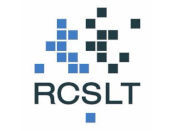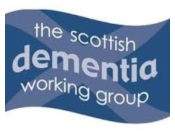
Living with dementia: showering and bathing
Living with dementia: showering and bathing
This factsheet is available for sponsorship, email marketing@dlf.org.uk
Sponsorship has no influence on our impartial content
Factsheet contents
- Introduction
- Aids and equipment for washing and bathing
- Grab rails
- Non-slip mats
- Single lever mixer taps
- Flood detector
- Water temperature
- Personal care items
- The shower
- Level access shower
- Carer half height screens
- Shower seats and stools
- Over-bath shower
- The bath
- Bath lifts
- Bath steps
- Advanced dementia
- Hair washers
- Hoists
- When is professional advice or assistance required?
- Assessing your needs
- Provision of equipment
- Funding sources for care
- For further advice from us
- Contributors
- Useful organisations and resources
- References and further reading
Introduction
For many, showering and bathing is a private activity and being able to continue independently with your washing habits and routines is important for personal hygiene, dignity and autonomy.
People living with dementia may experience continence problems - wet skin is more prone to damage, which can lead to sores and infections (Dementia UK, 2017). It is therefore very important to have a thorough wash to maintain clean and healthy skin.
Certain types of equipment or minor adaptations to the home can be helpful in order to manage your personal care.
General tips for using your bathroom
- Keep the bathroom warm
- Gather everything to hand before getting in the bath or shower
- Use familiar smelling soaps and shampoos
- Use familiar aftershave, perfume or body lotion
- Consider removing locks from the doors, so people can get in easily if assistance is needed.
Equipment for washing and bathing
Grab rails
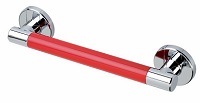 If you find getting in and out of the bath or shower a challenge or have difficulty standing, then a strategically placed grab rail in the shower or on the wall next to the bath can help. Grab rails which are in a contrasting colour from the bathroom wall or tiles can help them to stand out and be more visible and can also provide a physical cue to help with getting in and out of the bath or shower.
If you find getting in and out of the bath or shower a challenge or have difficulty standing, then a strategically placed grab rail in the shower or on the wall next to the bath can help. Grab rails which are in a contrasting colour from the bathroom wall or tiles can help them to stand out and be more visible and can also provide a physical cue to help with getting in and out of the bath or shower.
When fitting grab rails, ensure that they are the correct height for you to reach easily. For further advice on choosing and fitting rails read DLF's factsheet on Choosing and fitting grab rails. If you are in doubt about where to position your rails, please seek the advice of an occupational therapist.
Non-slip mats
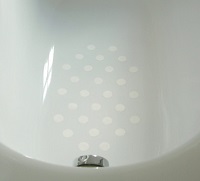 People living with dementia may be more prone to falls. For this reason, if you shower or bathe alone you need to be especially careful when getting in or out of the bath or shower. Surfaces can become slippery, especially if there is a residue of soap or hair conditioner left on them.
People living with dementia may be more prone to falls. For this reason, if you shower or bathe alone you need to be especially careful when getting in or out of the bath or shower. Surfaces can become slippery, especially if there is a residue of soap or hair conditioner left on them.
Non-slip mat discs or strips can provide extra grip to reduce the risk of falling.
Single lever mixer taps
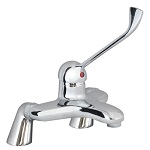 If you are having difficulty turning taps on and off due to a decrease in wrist flexibility and grip strength, lever mixer taps can offer a solution as they require less strength and flexibility of the wrist to operate. Levers which are integral to the tap are the most appropriate for people with dementia as they can be easier to use.
If you are having difficulty turning taps on and off due to a decrease in wrist flexibility and grip strength, lever mixer taps can offer a solution as they require less strength and flexibility of the wrist to operate. Levers which are integral to the tap are the most appropriate for people with dementia as they can be easier to use.
Flood detector
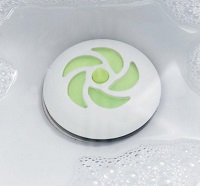 Leaving a sink or bath tap running can be a risk for people living with dementia. It is therefore useful to have a flood detector installed in the bathroom.
Leaving a sink or bath tap running can be a risk for people living with dementia. It is therefore useful to have a flood detector installed in the bathroom.
If the taps are left running and flooding is detected, an alarm sounds as a warning. The flood detector can be linked to a telecare system so that in the event of a flood, the telecare centre will be alerted. This service will then provide reassurance and advice on what action to take and will also contact a named carer or relative or the emergency services if necessary.
Water temperature
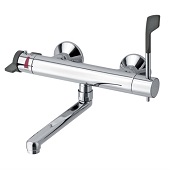 If hot water used for showering or bathing is above 44°C there is increased risk of serious injury or fatality, especially where large areas of the body are exposed to high temperatures. (Health and Safety Executive, 2012). The Department of Health (2016) recommends the temperature for bathing should be no higher than 44°C and showering at no higher than 41°C. For babies, the temperature should be no higher than 37°C.
If hot water used for showering or bathing is above 44°C there is increased risk of serious injury or fatality, especially where large areas of the body are exposed to high temperatures. (Health and Safety Executive, 2012). The Department of Health (2016) recommends the temperature for bathing should be no higher than 44°C and showering at no higher than 41°C. For babies, the temperature should be no higher than 37°C.
Thermostatic controls
Shower dials can be confusing for people living with dementia, increasing the risk of scalds. A thermostatic control on your shower is useful as it provides the reassurance that the water from your shower is constantly at a comfortable and safe temperature.
Water temperature indicators
Water temperature indicators are usually used prior to getting into the bath to reduce the risk of scalding. Temperature indicators show when the temperature of the bath or wash hand basin is above a safe level by changing colour or giving a reading of the water temperature.
Personal care items
Long handled equipment
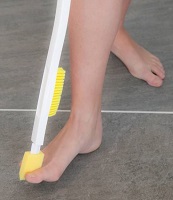 It is not unusual to lose some flexibility in shoulder and hip joints as part of the ageing process. Loss of flexibility can make it more difficult to wash your back, underarms or feet. Long handled equipment such as a sponge, toe washer or hair washer can help with washing those hard to reach areas.
It is not unusual to lose some flexibility in shoulder and hip joints as part of the ageing process. Loss of flexibility can make it more difficult to wash your back, underarms or feet. Long handled equipment such as a sponge, toe washer or hair washer can help with washing those hard to reach areas.
This equipment may be suitable to use in the early stages of dementia. As the condition progresses carers may need to provide guidance on how to use the long handled equipment effectively.
Nail clippers
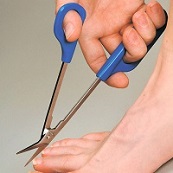 Keeping your toe nails trimmed is important for mobility and comfort and may reduce the risk of falling. However, it can be difficult to cut toe nails independently as you get older.
Keeping your toe nails trimmed is important for mobility and comfort and may reduce the risk of falling. However, it can be difficult to cut toe nails independently as you get older.
Long handled nail clippers may be useful for people with early stage dementia, or a carer or a podiatrist can help with cutting nails. There are many podiatrists available privately or on the NHS.
Lotion applicators
 Applying lotion and creams to hard to reach areas is difficult. A long handled lotion applicator could be useful for people living with early stage dementia. However, in the later stages of dementia it is likely that a carer or family member will need to provide assistance with this task.
Applying lotion and creams to hard to reach areas is difficult. A long handled lotion applicator could be useful for people living with early stage dementia. However, in the later stages of dementia it is likely that a carer or family member will need to provide assistance with this task.
The shower
Level access shower
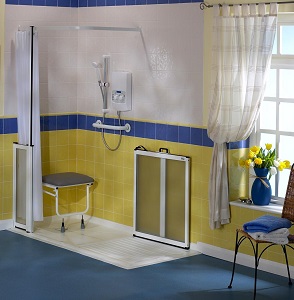 A level access shower can be a solution to bathing or showering problems for people with early stage dementia through to the end stages.
A level access shower can be a solution to bathing or showering problems for people with early stage dementia through to the end stages.
As dementia progresses, it may become more difficult to use bathing equipment such as bath lifts and seats due to confusion or physical limitations. This may mean it is too difficult to use the bath or over bath shower. A level access shower can be the solution to this.
With this type of shower access is level, in contrast to standard cubicle showers which have a step or lipped threshold which may become impossible to negotiate in the later stages of dementia. The larger shower tray of the level access shower can accommodate half height shower screens and space for carers to assist with showering. Level access showers can also accommodate a wide variety of shower seat styles, from drop down seats to wheeled shower chairs of various designs which can be used with hoists.
If you decide to have a level access shower, it may be useful to consider installing it during the early stages of dementia so that you can be involved in choosing the shower and becoming familiar with its use, thus getting greater benefit from it.
Funding or grants may be available to pay for, or assist with, the cost of a level access shower. More information on assessments and grants can be found in DLF's factsheet on Showering.
Carer half height screens
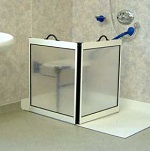 People living with dementia may need help with showering as the condition progresses. A carer half height screen allows a carer to assist someone in the shower without them getting wet. The screens can be folded back when not in use.
People living with dementia may need help with showering as the condition progresses. A carer half height screen allows a carer to assist someone in the shower without them getting wet. The screens can be folded back when not in use.
Shower seats and stools
 Age and dementia can have an impact on fatigue levels as well as on strength and balance. Because of this, people may experience difficulty standing in the shower or dizziness when closing eyes to shampoo hair or when moving around in the shower. Shower seats can offer a solution to this by allowing you to sit safely while showering.
Age and dementia can have an impact on fatigue levels as well as on strength and balance. Because of this, people may experience difficulty standing in the shower or dizziness when closing eyes to shampoo hair or when moving around in the shower. Shower seats can offer a solution to this by allowing you to sit safely while showering.
Wall mounted shower seats
Wall mounted shower seats can be a good option, especially in showers where space is limited. They range from a basic style seat to ones with drop down arms and padding. For people in later stage dementia who may have continence or pressure needs, a padded seat with an aperture can be added. If you choose a wall mounted seat, you need to ensure that it is the correct height for you - to obtain the correct height, ask someone to measure the back of your leg, from the heel to the back of the knee, when you are sat on a chair. This measurement will give you the best height of your shower chair. If you are in doubt about the measurement, you can seek an assessment by an occupational therapist.
Shower stool
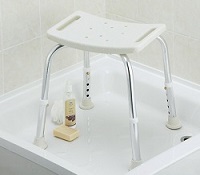 Standing up in the shower can be tiring; a shower stool can help with this as it allows you to shower whilst seated. You need to ensure that you have sufficient space in the shower tray to accommodate the stool.
Standing up in the shower can be tiring; a shower stool can help with this as it allows you to shower whilst seated. You need to ensure that you have sufficient space in the shower tray to accommodate the stool.
Shower stools generally come without a backrest so they take up less space than a chair, but do require good core strength and balance. As dementia progresses you may require a shower chair which has a backrest and arms so is a more supportive seat.
Shower chairs
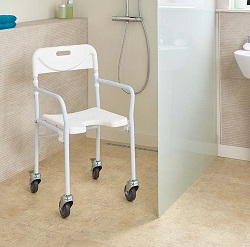 Shower chairs are generally height adjustable and come with a back rest and arms. They provide back support whilst showering, which is useful when it is difficult to balance when sitting, posture is poor or the person is easily fatigued.
Shower chairs are generally height adjustable and come with a back rest and arms. They provide back support whilst showering, which is useful when it is difficult to balance when sitting, posture is poor or the person is easily fatigued.
Some shower chairs have wheels which enable you to be wheeled into the shower. This can be a useful feature for people at the later stages of dementia being assisted by a carer. However, the wheeled shower chair can only be accommodated in a level access shower where it can be wheeled straight in without the need to cross a threshold or step.
Some shower chairs come with apertures which can assist the occupant or carer to wash personal areas - this is especially useful if continence is an issue.
In addition, some shower seats come with soft cushioned seats. This helps to protect pressure areas which can become vulnerable in later stage dementia due to incontinence or immobility.
If space is limited, a wheeled shower chair may suit. Some double up as a commode. They allow the user to be wheeled to the shower. These chairs can also come with cushioned seats and apertures.
Over-bath shower
Difficulty getting over the side of the bath to reach the over-bath shower is a common problem for many people as they age or have dementia. Below are various types of equipment which can help with getting in and out of an over-bath shower.
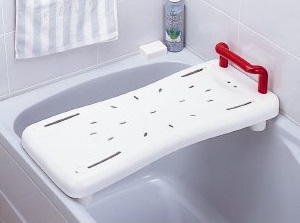 Shower board or bath board
Shower board or bath board
A shower board may offer a solution - it can help with getting in and out of the bath and provides a seat to sit on while showering. The board is placed across the top of the bath.
To use, the person will need to be able to sit on the board and move back as far as possible and then raise their legs over the side of the bath - this requires good balance. Some shower boards come with a handle to assist with stability or a shower board could be used in conjunction with a wall mounted grab-rail.
Using a shower board involves learning a new way of getting in and out of the bath; it would only be suitable for people in the early stages of dementia or for those with a carer or relative who can provide prompting on how to use the shower board safely.
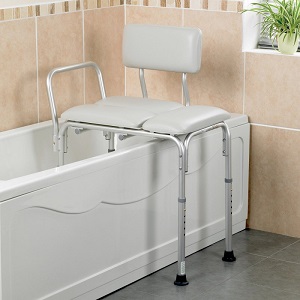 Bath benches
Bath benches
Bath benches can help with access to an over-bath shower. To get onto the bath bench, the person needs to slide on and move back as far as possible and then raise their legs over the side of the bath.
When sitting on the bench in the bath you can shower comfortably while sitting, and you can stand up in the bath if it is safe to do so.
Some people find that the benches are easier to use than shower boards - they are longer and have a handle to pull on. Assistance from a carer or family member may be needed to use the bath bench.
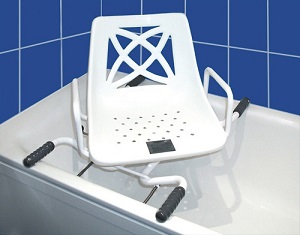 Swivel bather
Swivel bather
If there is difficulty with sitting safely or fatigue, a shower board may not provide sufficient support. The swivel bather enables the person to have a shower whilst seated in a chair with full back support.
To use the swivel bather, the person sits on the seat at the side of the bath. A lever is used to swivel the seat around, which brings the person to sitting above the bath positioned to have an over-bath shower. To use the swivel bather independently, the person will need to be able to use the lever correctly and also have the strength and co-ordination to initiate the swivel action of the seat.
Learning how to use the swivel bather involves taking on a new process; it would only be suitable for people in early dementia and for those with a carer or relative who can provide prompting. Many people find the swivel bather works well with the assistance of a carer.
The bath
Bath lifts
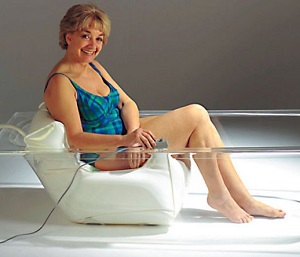 If it is difficult to get in and out of the bath, a bath lift allows you to be seated in the bottom of the bath with the support of a backrest. The bath lift is usually battery operated. It can also come in inflatable form, which is lighter and can be stored away when not in use.
If it is difficult to get in and out of the bath, a bath lift allows you to be seated in the bottom of the bath with the support of a backrest. The bath lift is usually battery operated. It can also come in inflatable form, which is lighter and can be stored away when not in use.
To get onto a bath lift, sit and then slide across onto the seat which is raised to the level of the bath sides, then lift the legs over the side of the bath. The seat is then lowered using a handheld button control unit. When you are finished bathing, you press the control button which raises the seat up and reverses the process. The button control unit is usually kept on charge when not in use. There is a lot of new information to take on board to use the bath lift safely. For this reason, bath lifts may not be suitable without help from a carer or family member.
If you are in any doubt about your ability to use one safely it would be advisable to try one out before purchase by visiting an equipment demonstration centre.
Further reading: More about bath lifts can be found in DLF's fact sheet, Choosing equipment for bathing.
Bath steps
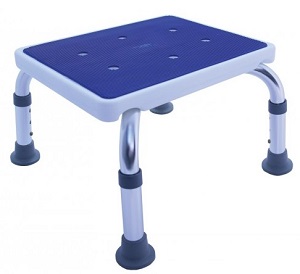 Some bath sides can be high which can make getting in and out of a bath difficult, especially for people of shorter stature. A bath step can provide a solution to this.
Some bath sides can be high which can make getting in and out of a bath difficult, especially for people of shorter stature. A bath step can provide a solution to this.
To use, the step is placed next to the bath.
Please be aware that when getting out of the bath and onto the bath step, it is important to have the awareness to step directly onto the bath step and not onto the side, as this could risk a fall. For this reason, the bath step may only be suitable for people with early stage dementia and with reasonable balance and vision. It can also be of use if assistance is available to guide someone in how to use the bath step.
Advanced Dementia
Hair washers
Hair washing can be challenge for people in the late stages of dementia. An inflatable hair washing tray assists carers with the task of washing hair. The tray, which can be inflated using a pump or by blowing, accommodates the head and hair as the person rests lying on the bed.
Hoists
People living with dementia could find transfers difficult in the latter stages of the condition and may require hoisting. If a hoist is needed, carers or family members should introduce the hoist gradually to minimise any anxiety or fear about being moved in this way. It is important to let the person who is going to be lifted know what the hoist and sling is for. It can be helpful if a second carer or family member is present, who can provide reassurance throughout the process of hoisting.
Toileting slings can enable carers to assist with toileting and maintaining hygiene. If a person is hoisted onto a wheeled shower chair, they can then be wheeled directly into the bathroom to use the basin, toilet or level access shower.
Further reading: More about hoists can be found in DLF's fact sheet, Choosing equipment for bathing.
When is professional advice or assistance required?
You many benefit from a professional assessment or advice before purchasing some equipment.
- This is to ensure that the equipment will meet individual requirements and that the person using the equipment is able to do so independently and safely or it is manageable with assistance from a carer or family member
- For larger and more complex equipment such as bath seats, lifts or specialist shower seating, it would be advisable to be assessed by an occupational therapist
- Major items such as level access showers may also require the advice of an occupational therapist
- You may also benefit from advice on positioning of rails, the toilet and sink to ensure that there is sufficient turning space for mobility aids or wheelchairs. In addition, you can be measured so that your drop-down seat and rails are at the right height for you.
- If the person is at risk of pressure sores, take professional advice when purchasing or acquiring bathing or showering equipment, as specialist pressure relieving cushioning may be required. Also, some equipment may not be suitable and could be detrimental.
- If the person requires hoisting, a professional assessment is needed. Advice can then be provided on specialist slings for showering, bathing and toileting.
Further reading
DLF fact sheets: Choosing equipment for showering and Choosing equipment for bathing.
Alzheimer’s Society fact sheet Managing washing and bathing, including practical advice for helping a person to wash.
Assessing your needs
A range of conditions may cause forgetfulness, anxiety, low mood and confusion, however they may also be early signs of dementia. A visit to your GP would be recommended to rule out other causes and allow for a better understanding of the illness and how it may progress, as well as strategies on how to manage the symptoms.
The assessment for dementia is a process that takes time and goes through various stages and tests. These may include a physical examination, a blood test and interviewing both the person and their concerned friend/relative separately. This may lead to a referral to a local memory service or clinic. The GP, Community Psychiatric Nurse or a member of the memory clinic staff will be able to advise on symptoms, how the disease may develop and provide information on appropriate treatment. They will also be able to advise you on what support there is available locally. Prior to an appointment it can be useful to keep a journal or diary of any tasks that have become more difficult or concerns that you may have.
The GP can refer you for a Health and Social Care Needs Assessment, or you can contact your local authority Adult Social Care Department and make a self-referral, or have a friend or relative do it for you. By law anyone who appears to need care and support can request an assessment regardless of their income or savings.
The assessment will focus on your needs, how they impact on your well-being and on what you want to achieve and will aim to identify any difficulties you may have in caring for yourself. An Occupational Therapist will carry out the assessment and will be able to advise on strategies to help reduce any identified risks and recommend any equipment that may be helpful to maintain independence. If someone else is helping you they are also entitled to a carers assessment, which will help to identify what help and support they may need.
There are a number of charitable organisations listed below that can provide help and support for the person with dementia and their relatives and carers.
Provision of equipment
Many simple assistive technology devices mentioned in this fact sheet can be privately purchased. Others can be provided by local authorities or the NHS to meet an assessed need; you or a family member can request a home assessment from an occupational therapist
Permanent loan: Local Authority and health provision
If you require disability equipment, telecare or adaptations to your home then your local authority may be able to help. They can supply equipment or minor adaptations that cost under £1,000, free of charge. (Department of Health 2014, section 2.9). In Scotland, Local Authorities make their own arrangements for provision of minor adaptations and details can be accessed via your Council's website.
Some equipment such as pressure relieving cushions, mattresses, some mobility aids and wheelchairs are supplied by your local Health Authority. A referral to the District Nurse or Wheelchair Service for these items can be made via your GP or other health professionals including a Community Occupational Therapist or Physiotherapist.
Disabled Facilities Grant (DFG)
Should you need adaptations to your home that cost more than £1,000 that will allow you to continue to live there, you may be eligible for a Disabled Facilities Grant (DFG). An Occupational Therapist will complete an assessment and if the work is deemed necessary to meet your needs and is reasonable and practical, then they will arrange for a financial assessment to be undertaken.
If you meet the criteria for funding, the Occupational Therapist will make recommendations for the adaptations required.
Private purchase
If you do not wish to use local authority services, there are independent Occupational Therapists who can assess your needs and help to advise or assist you in buying any equipment or arrange adaptations to your home that you may require.
You can also purchase equipment privately, but it is recommended that you compare different options first. There may be an equipment demonstration centre near you where you can look at and try out equipment before purchasing, as well as receiving impartial advice.
Charity and Grant funding
Charitable trusts may sometimes provide equipment or give a grant for equipment purchase.
Turn2Us is a national charity that helps people who are in financial difficulty find grants for the provision of equipment, and Community Care gives a list of charitable organisations that give grants.
Charities tend to give awards in accordance with a predetermined criterion, so it is important that you carefully select the organisations that apply to your condition. There are also some workplace charities that will provide support for ex-employees. If you are or have served in the Armed Forces, or are a dependent or carer of a person who has served, The Royal British Legion may be able to provide you with support for specialist dementia care or grants for equipment and adaptations to your home, or small crisis grants to meet unexpected expenses.
Funding sources for care
If you need support with daily tasks that may include help from a carer, the delivery of meals or residential care then your local authority may help with the cost. How much support you are entitled to will depend on your income and savings and what your care needs are. A financial assessment of your means will be carried out to establish how much support you are entitled to.
You may be eligible for further financial support such as Attendance Allowance or Personal Independence Payment (PIP) and if you have a person who cares for you for 20 hours or more a week, they may be eligible for some financial support.
If you live alone you can apply to your local authority for a 25% reduction on your Council Tax bill, or if you live with someone else then they may be eligible for a 25% reduction on the Council Tax bill. As your condition progresses, they may be eligible for a further 25% reduction.
Private carers and residential care
If you are looking for a carer or are considering residential care, then you should ensure that the staff are trained in dementia care and are able to give the specialist help you need. A residential home should be designed to provide the best possible environment for you. There are a number of organisations that can help you with choosing a suitable home, including:
- Elderly Accommodation Council
- Housing Care.org
- DementiaUK
- Relatives and Residents Association
- Paying for Care
Care Home ratings/selector
Inspection reports and care home ratings can be found via:
- England – Care Quality Commission
- Scotland – Care Inspectorate
- Wales – Care Inspectorate Wales
- Northern Ireland – Regulation and Quality Improvement Authority
Charity and Grant funding
Charitable trusts may sometimes provide funding for care, nursing or residential respite, permanent care or a befriending service. Charities tend to give awards in accordance with a predetermined criterion, so it is important that you carefully select the organisations that apply to your condition. There are also some workplace charities that will provide support for ex-employees. If you are or have served in the Armed Forces, or are a dependent or carer of a person who has served, The Royal British Legion may be able to provide you with support for specialist dementia care or small crisis grants to meet unexpected expenses.
Further information relating to grants is available from:
- Community Care – a list of charities providing grants.
- Turn2us - Turn2us is a national charity that helps people in financial hardship gain access to welfare benefits, charitable grants and support services.
- Housing grants information from Disability Rights UK - led by people with diverse experiences of disability and health conditions, from different communities.
- Disability Grants - grants for disabled adults.
- My grants - accessibility grants for disabled and older people.
- Grants for individuals - this website is run by the Directory of Social Change and lets subscribers search for grants. It is intended for organisations searching for funding on behalf of individuals.
- The Money Advice Service - Charitable grants and major and minor adaptations.
VAT relief
If you have a diagnosed long-term condition, you may be able to claim VAT relief on purchases relating to the condition. The company supplying the equipment should be able to advise you, or there is general information on VAT relief on the GOV.UK website.
For further advice from us
For clear, practical advice and information on products and suppliers of daily living equipment, please have a look at our Living made easy website.
If you would like further advice related to choosing equipment for everyday living you could try relevant sections of AskSARA, our free online guided advice tool. AskSARA will ask you questions about yourself and your environment and then offer relevant advice, product suggestions and supplier details.
You can contact the DLF Helpline, which is open Monday to Friday from 10am to 4pm. Tel: 0300 999 0004 (calls charged at your standard land line rate even if you are phoning from a mobile).
Alternatively, you may wish to contact us via email: info@dlf.org.uk or by letter: DLF, 34 Chatfield Road, Wandsworth, London SW11 3SE.
To help us give you a concise and informative reply, please provide us with as much detail as possible, including information on the difficulties you are having and any solutions you have considered, such as equipment ideas.
Another source of advice is a disabled or independent living centre where you would have the opportunity to try out a range of equipment. There are several of these around the country where you can go for impartial advice. Your local authority will also be able to give you details of centres in your area.
Contributors
Roisin Hodgson
 Roisin Hodgson qualified as an occupational therapist in 1993 and has worked extensively in hospitals and within the community. Now working as a private occupational therapist, Roisin has an interest in occupational therapy approaches to anxiety, panic and post traumatic stress disorder. Many of Roisin's clients have dementia; she works with them and their families advising on a range of solutions to help maintain independence, including home adaptations, daily living aids and telecare.
Roisin Hodgson qualified as an occupational therapist in 1993 and has worked extensively in hospitals and within the community. Now working as a private occupational therapist, Roisin has an interest in occupational therapy approaches to anxiety, panic and post traumatic stress disorder. Many of Roisin's clients have dementia; she works with them and their families advising on a range of solutions to help maintain independence, including home adaptations, daily living aids and telecare.
Rebecca Woodfield
 Rebecca Woodfield is an occupational therapist working for the NHS in Oxfordshire. Rebecca works with older adults in the community, supporting people to live independently in their own homes. Rebecca has a BSc (Hons) degree in Occupational Therapy from Coventry University and is currently studying a masters module Expertise in Dementia with the University of West London.
Rebecca Woodfield is an occupational therapist working for the NHS in Oxfordshire. Rebecca works with older adults in the community, supporting people to live independently in their own homes. Rebecca has a BSc (Hons) degree in Occupational Therapy from Coventry University and is currently studying a masters module Expertise in Dementia with the University of West London.
Nina Evans
 Nina Evans works alongside the design team at Designability. Working in partnership with users, carers and professionals, Nina carries out clinical trials with end-users, developing and promoting assistive technology to improve quality of life. Nina's qualifications include a Diploma of the College of Occupational Therapists and an MSc in Clinical Research.
Nina Evans works alongside the design team at Designability. Working in partnership with users, carers and professionals, Nina carries out clinical trials with end-users, developing and promoting assistive technology to improve quality of life. Nina's qualifications include a Diploma of the College of Occupational Therapists and an MSc in Clinical Research.
Useful organisations and resources
Age UK Advice is a free, confidential, national phone service for older people, their families, friends, carers and professionals. Their team of experts can provide advice and information on a number of topics including benefits, concerns about hospital stays, advice choosing care homes etc. The website can signpost you to local services including home helps, foot care, handy person services and dementia support.
The Age UK network includes Age Scotland, Age Cymru and Age NI.
Alzheimer's Society's website provides advice and support regarding all aspects of dementia – including the different types of dementia, symptoms, diagnosis and treatments available. They also run Dementia Connect, a comprehensive services directory for people affected by dementia - areas cover England, Wales and Northern Ireland.
.
Website: www.alzscot.org
24 hour Dementia Helpline: 0808 808 3000
Alzheimer Scotland provides a wide range of specialist services for people with dementia and their carers. They offer personalised support services, community activities, information and advice at every stage of the dementia journey.
Disabled Living
Burrows House, 10 Priestley Road
Wardley Industrial Estate, Worsley
Manchester, M28 2LY
Website: www.bbuk.org.uk
Telephone: 0161 607 8219
Email: bbuk@disabledliving.co.uk
Bowel and Bladder UK's National Confidential Helpline is managed by a team of Specialist Nurses and Continence Product information staff, who can be contacted for advice on specialist services, product information and general advice to help treat or manage bladder and bowel problems that may occur as a symptom of Dementia. Opening hours Monday to Friday 9am–4.30pm.
5th Floor, Charles House
148/9 Great Charles Street Queensway
Birmingham, B3 3HT
Website: www.bda.uk.com
Telephone: 0121 200 8080
The BDA is the only body in the UK representing the whole of the dietetic workforce. It is a trade union and professional body representing the professional, educational, public and workplace interests of its members.
Head Office
20 Great Dover Street
London SE1 4LX
Website: www.carersuk.org
Telephone: 020 7378 4999
Carers UK provide advice and support for all carers, whether they are new to looking after someone or have been a carer for a long time. Their telephone advice and support service is available if you wish to talk to someone about caring, with further information and advice available on the website. The website also provides contact details for Carers Wales, Scotland and Northern Ireland.
Carewatch Care Services Ltd
Libra House, Sunrise Parkway
Linford Wood
Milton Keynes MK14 6PH
Website: www.carewatch.co.uk
Telephone: 01908 557 950
Carewatch provide home care services throughout the UK, designed to enable people to remain as independent as possible within their own home. They offer multiple services including home visits, personal care, practical help, live-in care and dementia care at home and long term home care.
Dementia Friends provides information, support and learning for those who have a relative or know someone with dementia. Anyone of any age can be a dementia friend. Visit their website for more details.
Second Floor
356 Holloway Road
London N7 6PA
Website: www.dementiauk.org
Telephone: 020 7697 4160
Support line: 0800 888 6678
Dementia UK provide specialist dementia support for families through their Admiral Nurse service. The Admiral Nurses work with families giving one-to-one support, expert guidance and practical solutions.
Unity House
Westwood Park
Wigan, WN3 4HE
Website: www.lewybody.org
Telephone: 01942 914000
Support line: 0800 888 6678
Email: info@lewybody.org
The Lewy Body Society funds research into Dementia with Lewy Bodies (DLB). It's mission is to raise awareness of DLB among the general public and those in the medical profession and decision making positions, They also provide information resources for patients and carers.
Website: www.nhs.uk
NHS Choices provides comprehensive information on the help and support available for people living with dementia. Other NHS websites include: NHS Inform (Scotland), Health and Social Care online (N.I.) and NHS Direct Wales.
Website: www.nhs.uk
The Patient Advice and Liaison Service from the NHS offers confidential advice, support and information on health-related matters. They provide a point of contact for patients, their families and their carers when using NHS services. Your local PALS service can be located using the search facility on their website.
Website: www.nice.org.uk
NICE provides national guidance and advice to improve health and social care.
The RICE Centre
Royal United Hospital
Combe Park
Bath, BA1 3NG
Website: www.rice.org.uk
Telephone: 01225 476420
Email: info@rice.org.uk
RICE is a registered charity committed to undertaking and publishing effective research aimed at improving the diagnosis, assessment and treatment of people with Alzheimer’s disease and other forms of dementia. The charity also offers several healthcare services for people living with dementia including a memory clinic.
106-114 Borough High Street
Southwark
London SE1 1LB
Website: www.rcot.co.uk
Telephone: 020 7357 6480
Email: reception@rcot.co.uk
The Royal College of Occupational Therapists is the professional membership body for occupational therapy staff in the UK. Their website includes information on how to find an independent occupational therapist through their online directory.
2 White Hart Yard
London SE1 1NX
Website: www.rcslt.org
Telephone: 020 7378 1200
The RCSLT is the professional body for speech and language therapists in the UK providing leadership and setting professional standards.
81 Oxford Street
Glasgow, G5 9EP
Website: www.sdwg.org.uk
Telephone: 0141 410 1171
Email: sdwg@alzscot.org
Funded by Alzheimer Scotland and the Scottish Government SDWG is an independent group run by people with dementia, their families and carers, which campaigns on behalf of, and provides a voice for, people living with dementia in Scotland.
Watson House
54 Baker Street
London W1U 7EX
Website: www.scie.org.uk
Telephone: 020 7766 7400
Email: info@scie.org.uk
The Social Care Institute for Excellence (SCIE) improves the lives of people who use care services by sharing knowledge about what works. It is a leading improvement support agency and an independent charity working with adults’, families’ and children's care and support services across the UK. The website contains a library of resources and services on wide range of topics, including dementia.
SFE Administrator
Studio 209, Mill Studio Business Centre
Crane Mead
Ware
Hertfordshire, SG12 9PY
Website: www.sfe.legal
Telephone: 0844 567 6173
Email: sfe@standagency.com
Solicitors for the Elderly provide a service to help you locate a local solicitor, near you, to help you with wills, power of attorney, trusts, probate, paying for care and other legal needs. They are a national organisation across the UK and the Republic of Ireland
Wimslow House
Water Lane
Grove Way
Wimslow, SK9 5AG
Website: www.tsa-voice.org.uk
Telephone: 01625 520320
Email: admin@TSA-Voice.org.uk
The website has information on the telecare industry and the services it provides to individuals. The TSA aims to promote and support the telecare industry and highlight the benefits of telecare for service users, their friends, family and carers.
Released January 2019, to be reviewed by January 2022, Version 1
References and further reading Show references
Alzheimer’s Society: Washing and bathing (2015). Available from: https://www.alzheimers.org.uk/sites/default/files/migrate/downloads/factsheet_washing_and_bathing.pdf
Alzheimer’s Society: Making your home dementia friendly. Available from: https://www.alzheimers.org.uk/sites/default/files/migrate/downloads/making_your_home_dementia_friendly.pdf
Living Well with Dementia: Power Autonomy and Independence blog 2018 Malcolm Bray. Available from https://www.nesta.org.uk/blog/living-well-dementia-power-autonomy-and-independence/
NHS: Dementia guide, symptom of dementia. Available from https://www.nhs.uk/conditions/dementia/symptoms/
Nursing Times: Maintaining continence in people with dementia. Available from https://www.nursingtimes.net/clinical-archive/continence/maintaining-continence-in-people-with-dementia/5060718.article
Social care Institute for Excellence: Advance dementia. Available from https://www.scie.org.uk/dementia/advanced-dementia-and-end-of-life-care/advanced-dementia/livingwithadvanceddementia.asp
College of Occupational Therapists (2016) Care Act 2014: Guidance for Occupational Therapists. Prevention. London: COT. (Type 2)
College of Occupational Therapists (2006) Minor adaptations without delay. London:COT - (Type 2)
Mandelstam M (2016) Legal framework for equipment provision guidelines. London: London Borough Occupational Therapy Management Group. (Type 2)
Pain H, McLellan L and Gore S (2003) Choosing assistive devices: a guide for users and professionals. Jessica Kingsley Publishers : London and Philadelphia. (Type 1)
AskSARA
If you would like further advice regarding daily living equipment related to choosing equipment for everyday living you could try relevant sections of AskSARA.
AskSARA is our free online guided advice tool. AskSARA will ask you questions about yourself and your environment and then offer relevant advice, product suggestions and supplier details.
AskSARA's Bathing and personal care section
| Attachment | Size |
|---|---|
| 5.94 KB | |
| 5.46 KB | |
| 6.4 KB | |
| 10.04 KB | |
| 5.44 KB | |
| 11.79 KB | |
| 14.88 KB | |
| 11.67 KB | |
| 11.78 KB | |
| 44.88 KB | |
| 44.88 KB | |
| 9.24 KB | |
| 14.08 KB | |
| 9.44 KB | |
| 14.45 KB | |
| 22.52 KB | |
| 18.32 KB | |
| 27.22 KB | |
| 22.57 KB | |
| 23.25 KB | |
| 16.1 KB | |
| 654.91 KB |
All rights reserved. No reproduction or transmission of this publication may be made without written permission. Inclusion (including any sponsorship) does not indicate endorsement or that any item has been recommended or tested. All information is provided without legal responsibility.
Disabled Living Foundation, Tel: 020 7289 6111, Fax: 020 7266 2922, Helpline: 0300 999 0004 10.00am-4.00pm, Email: helpline@dlf.org.uk, Website: www.dlf.org.uk
Reg. Charity No: 290069, VAT Reg. No: 226 9253 54
 (Tell me about the standard)
(Tell me about the standard)

Your personal information is required in order to claim Gift Aid. This information is kept by DLF/Shaw Trust for financial audit purposes. For more information on our privacy policy visit: https://www.dlf.org.uk/content/privacy-policy
















